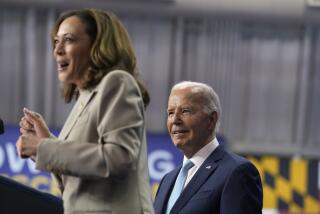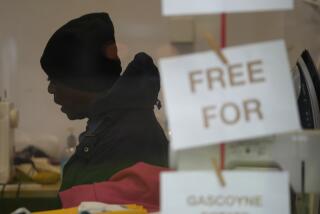Soviet Leader Also Indicates That Rents May Rise : Gorbachev Hints at Price Boosts for Bread, Meat, Milk
- Share via
MOSCOW — Soviet leader Mikhail S. Gorbachev may have signaled a bold move to raise prices on bread, meat, milk and other basic commodities in his speech to the 27th Congress of the Soviet Communist Party.
If he follows through, it could cost Soviet consumers tens of billions of rubles more each year to feed their families.
Western analysts said Wednesday it appears that the Kremlin chief is at least considering an end to subsidies that have kept some prices well below the actual cost of production.
One Soviet economist estimated that food subsidies now cost the state about 41 billion rubles a year (about $53 billion at the official exchange rate), with meat alone accounting for 20 billion rubles ($26 billion).
Gorbachev also gave strong indications that rents, held steady for almost 60 years as a percentage of income, would be increased.
Rather Ambiguous
The Soviet leader’s remarks on the subject in the five-hour speech opening the congress on Tuesday were, as customary, rather ambiguous.
“Prices should be made more flexible, and their level must be coordinated not just with production costs, but with consumer value of the goods, balance between supply and demand and correspondence of the product to the actual needs of the society as well,” Gorbachev said.
“Prices must become an active instrument in economic and social policies,” he added. “A planned, methodical reconstruction of the pricing system must be done, in the interests of setting up an efficient self-financing mechanism in our economy and in agreement with the task of increasing the real income of the population.”
Soviet citizens, accustomed to reading between the lines of official statements, interpreted Gorbachev’s statements as a suggestion that an overall increase in prices is imminent.
‘Deserve Attention’
As for apartment rents, traditionally very low, Gorbachev said: “Proposals on fair changes in the system of housing rental payments deserve attention. These changes should be closely tied with size and quality of the entire apartment.”
In other words, as one Muscovite said in decoding this paragraph, people with better-than-average apartments will pay more rent.
Gorbachev’s thinking may be based on research done at the Novosibirsk Institute of Economics, where some relatively radical ideas have been formed.
The magazine Eko, a showcase for the institute’s ideas, recently ran an article discussing the possible elimination of food subsidies.
‘Deserves Discussion’
“The issue of whether it is feasible to preserve the heavily subsidized prices for bread, cereals, flour, meat and dairy products deserves discussion,” wrote D.M. Kazakevich, a professor at the institute, in the January issue.
Kazakevich said that food subsidies amount to 41 billion rubles a year, with meat subsidies alone accounting for 20 billion.
While the resulting low prices help low-income groups satisfy their food needs, he said, the subsidies have adverse impacts as well.
“Low state prices for meat and dairy products interfere with balancing the supply and demand, artificially create and support their shortage. . . , “ Kazakevich wrote.
As average incomes increase, he added, people have more rubles to spend on high-quality clothing, shoes, furniture and cars, causing shortages of these goods.
‘Become Inaccessible’
“As a result, gradually these goods become inaccessible to the low-income categories of the population, whose interests dictated the price subsidies in the first place,” the writer added.
If prices are raised, Kazakevich added, low-income citizens should receive some form of stipends or benefits to relieve the burden on them.
He also favored an increase in apartment rents, arguing that the state provides a subsidy of 6 billion rubles a year (about $7.8 billion) just for maintenance, not to mention construction costs.
More to Read
Sign up for Essential California
The most important California stories and recommendations in your inbox every morning.
You may occasionally receive promotional content from the Los Angeles Times.













